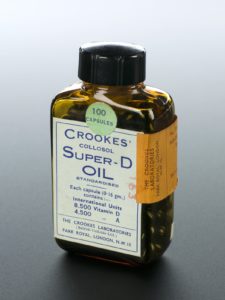Many doctors now test for Vitamin D deficiency. It is becoming more common than ever thought before, and is more likely in the winter when the days are shorter.
What is Vitamin D?
Vitamin D is a fat-soluble vitamin that helps our bodies absorb calcium that our bones use to stay healthy. Without Vitamin D, our bones become weak and brittle. Vitamin D prevents disease such as rickets in children. It also helps prevent osteoporosis in older people.
Vitamin D helps our cells, nerves, and muscles stay healthy. It is able to reduce inflammation in the body. Vitamin D also supports our immune system.
How does our body get Vitamin D
Most Vitamin D comes from the Sun
Our body gets much of its Vitamin D when exposed to the sun. When sunlight hits our skin, a reaction begins that starts to produce more Vitamin D in our bodies.
Because the amount of daylight in the winter is reduced, our bodies have much less opportunity to make its own Vitamin D.
Some Foods Contain Vitamin D
Not many foods contain Vitamin D. The highest amounts of Vitamin D are found in salmon, tuna and other fatty fish. Small amounts of Vitamin D are also found in egg yolks, cheese, and beef liver.
Some foods often have Vitamin D added to them – such as milk, yogurt, or cereal. Orange juice can be fortified with Vitamin D, too.
Who is at risk for Vitamin D Deficiency
People who don’t get enough sun
If you don’t get outside much, you are more likely to have a Vitamin D deficiency. If you have a job that is indoors, or need to have your head and skin covered a lot, this limits how much Vitamin D your body can make.
Using a lot of sunscreen also blocks your body from making Vitamin D.
Older people
As we age, our skin is not as good at making Vitamin D. Also, older people tend to stay inside more, limiting their sun exposure.
Vegetarians
Since most foods that contain the most Vitamin D are fish, meat, and eggs – vegetarians, especially vegans, get limited amounts of Vitamin D.
People with Crohn’s Disease or Celiac Disease
People who have inflammatory bowel disease, such as Crohn’s Disease or Celiac disease, don’t absorb Vitamin D as well.
Obese people
Since Vitamin D is a fat soluble vitamin, it can get snatched up by fat cells and hidden from the blood supply.
People who have had Gastric Bypass Surgery
Gastric Bypass Surgery removes part of the small intestine where Vitamin D is absorbed.
People with darker skin
People with darker skin absorb less Vitamin D. It appears that the increased melanin in skin interferes with the skin’s ability to make larger amounts of Vitamin D.
Breast-fed babies
Babies who are breast-fed usually do not get enough Vitamin D.
What happens with a Vitamin D Deficiency
If you do have a Vitamin D Deficiency, you are at increased risk for:
- Broken bones
- Diabetes
- Cancer
- Osteoporosis
- Heart problems
- Falling
Should you take Vitamin D Supplements
Talk to your doctor about Vitamin D. There are tests that can check your Vitamin D levels. If your doctor finds your Vitamin D levels are low, you might be prescribed Vitamin D supplements.
Many doctors recommend taking Vitamin D supplements during the seasons where you spend more time indoors, when the days are shorter. For example, it is common to recommend taking Vitamin D during fall, winter, and spring in the northeast.
Hollowbrook Foot Specialists (845) 298-9074 serving the Hudson Valley from Wappingers Falls.
By David Schlam



